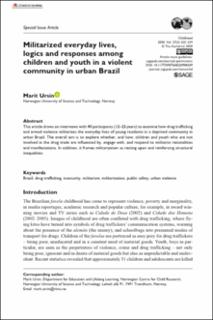| dc.contributor.author | Ursin, Marit | |
| dc.date.accessioned | 2021-04-23T12:06:20Z | |
| dc.date.available | 2021-04-23T12:06:20Z | |
| dc.date.created | 2020-02-28T17:34:43Z | |
| dc.date.issued | 2020 | |
| dc.identifier.citation | Childhood. 2020, 27 (3), 325-339. | en_US |
| dc.identifier.issn | 0907-5682 | |
| dc.identifier.uri | https://hdl.handle.net/11250/2739360 | |
| dc.description.abstract | This article draws on interviews with 40 participants (12–25 years) to examine how drug trafficking and armed violence militarizes the everyday lives of young residents in a deprived community in urban Brazil. The overall aim is to explore whether, and how, children and youth who are not involved in the drug trade are influenced by, engage with, and respond to militarist rationalities and manifestations. In addition, it frames militarization as resting upon and reinforcing structural inequalities. | en_US |
| dc.language.iso | eng | en_US |
| dc.publisher | SAGE | en_US |
| dc.rights | Navngivelse 4.0 Internasjonal | * |
| dc.rights.uri | http://creativecommons.org/licenses/by/4.0/deed.no | * |
| dc.title | Militarized everyday lives, logics and responses among children and youth in a violent community in urban Brazil | en_US |
| dc.type | Peer reviewed | en_US |
| dc.type | Journal article | en_US |
| dc.description.version | publishedVersion | en_US |
| dc.source.pagenumber | 325-339 | en_US |
| dc.source.volume | 27 | en_US |
| dc.source.journal | Childhood | en_US |
| dc.source.issue | 3 | en_US |
| dc.identifier.doi | https://doi.org/10.1177%2F0907568220908309 | |
| dc.identifier.cristin | 1798546 | |
| cristin.ispublished | true | |
| cristin.fulltext | postprint | |
| cristin.qualitycode | 2 | |

